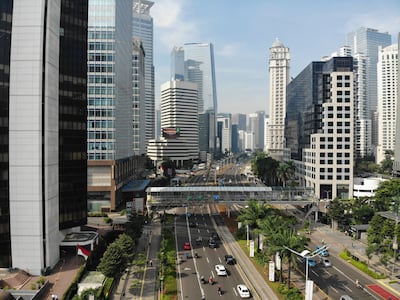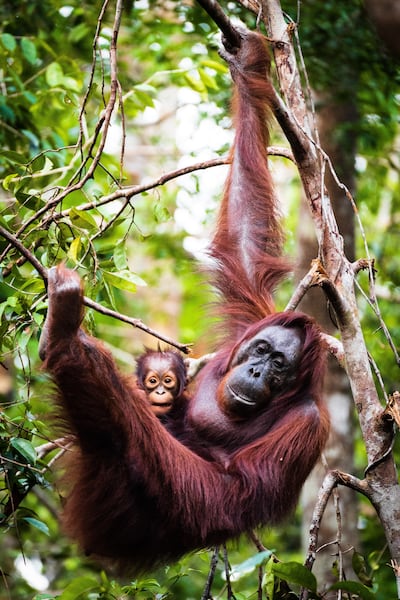In January, Indonesia's Parliament passed a law to move the country's capital from Jakarta to the East Kalimantan province on the island of Borneo, in an area that will become known as Nusantara.
For many travellers, Jakarta is a well known hot spot, but East Kalimantan remains largely a mystery.
With the big move, however, as the new Presidential Palace and Parliament buildings are set to be completed in 2024, tourism officials and players in the world’s largest archipelago and beyond might want to seize new opportunities there.
Why is East Kalimantan the new capital?
The Indonesian government hopes the moving of the capital will achieve more equitable economic development in the nation’s eastern regions. There is also a lower risk of natural disasters than in Java, the nation's most populated island, where Jakarta is located.
The current capital, Indonesia’s largest city of more than 10 million people, would remain its commercial hub, however.

What does the region offer tourists?
Sandiaga Uno, Indonesia's Tourism and Creative Economy Minister, recently said that the tourism potential in Nusantara, the country's planned new "green capital" situated on the Indonesian part of Borneo island — divided between Indonesia, Malaysia and Brunei — would predominantly be ecotourism and cultural tourism.
Nusantara, meaning archipelago, will be situated in Penajam North Paser and Kutai Kartanegara, two regencies in East Kalimantan province.

"If we look at East Kalimantan, what we need to protect is its environmental sustainability," he said.
Borneo, after all, is one of the world's largest islands, and has one of the oldest rainforests on the planet and vast biodiversity, with about 15,000 species of flowering plants, 3,000 species of trees, 221 species of terrestrial mammals and 420 types of resident birds.
“The hope is that tourism, especially based on ecotourism, with the concepts of culture and nature, will strengthen our position to give priority to the preservation of our environment,” the minister said.
What’s in East Kalimantan now?
Residents in the province of more than 3.7 million people work in fields, including mining, oil and gas, horticulture, agriculture and palm oil. Many locals also work as fishermen in the rural regions.
The major cities Balikpapan and Samarinda are dominated by the services industry, such as hotels and restaurants.
Muhammad Agung Khisbullah, the head of the Indonesian Tourist Guide Association's Penajam North Paser branch, says Goa Tapak Raja (Tapak Raja Cave) is a must-visit.
Residents first found the cave in 1983, according to Indonesia’s state-run news agency Antara, and stalactites that resembled large human footprints had formed within.
"It also has not been exposed [widely]," Khisbullah tells The National. "Even the village government is trying to develop it as a tourist village.”
Khisbullah says another tourist site rich in the culture of the indigenous Paser tribe would be the Mentawir region in Sepaku district, where visitors can find a mangrove forest and rafting spots.
"There is even an old tomb as evidence of their [Paser tribe] cultural history, and even there they have special cuisine [snacks made of mangroves] made by the local community.” He says the tomb belonged to a resident who died some time between the 1800s and early 1900s.
Another site on the travel bucket list is Mulawarman Museum. Housed in a former palace of a local sultanate built during the Dutch colonial period in the 1930s, it is situated in Kutai Kartanegara regency. Visitors there can peruse fascinating artefacts, some of which even date back to the Ming dynasty. The museum also retains the traditional architecture of the Dayak tribe.
Beyond the soon-to-be capital, the province has a variety of natural spots.

Derawan Islands, with its chain of isles, are a popular site for island-hopping. Tourists can snorkel, swim with jellyfish and sharks, walk around the white sand beach, see the reef and stay at one of the floating cottages. Local tour operators often run trips there. From Balikpapan, it takes about a one-hour flight before taking a car and another speedboat to reach there.
Samboja Lestari, part of the new capital, is also where some wild Bornean orangutans get rehabilitated by the Borneo Orangutan Survival Foundation, in collaboration with the Indonesian government.
"The BOSF together with the government [has so far] rehabilitated approximately 400 orangutans and 100 of them are in Samboja Lestari," the foundation's chief executive Jamartin Sihite tells The National. "Samboja is not a home for orangutans, but a place [for them] to be trained to be wild."
What else is yet to come?
Nicko Herlambang, development section head of Penajam North Paser's district secretariat, says a "waterfront city" is currently being built on the coast of Nipah-Nipah and Nenang districts. The zone would later combine facilities, including restaurants, cultural centres, parks and resorts.
"It will be the centrally concentrated accommodation resort infrastructure supporting the tourism of Penajam Paser Utara regency," he tells The National.
However, residents say there are significant areas that still need improvement.
Nur Ariyanti, the head of the Penajam North Paser chapter of the professional tourism organisation Masyarakat Sadar Wisata (Masata), says a lack of transportation options needs to be addressed, as the only way to reach the region at present is via motorboats and ferries.
Meanwhile, Sayyid Hasan, chairperson of the Indonesian Young Entrepreneur Association's chapter in the regency, says supporting facilities on location are "still very minimal”. This includes a toll bridge that connects Balikpapan and Penajam North Paser and is scheduled to be finished by 2024.
Once established, the bridge could accelerate the flow of people and goods and increase tourism potential.
How do you get there?
For now, visitors looking to head to East Kalimantan would need to fly from Jakarta to reach either Samarinda or Balikpapan. From there, it takes about two hours by land to reach the soon-to-be-named Nusantara.
An airport is not yet established in the capital site to allow direct flights from Jakarta. However, the Indonesian government plans to build an international airport by 2024 and a mass rapid transit system within the city.



